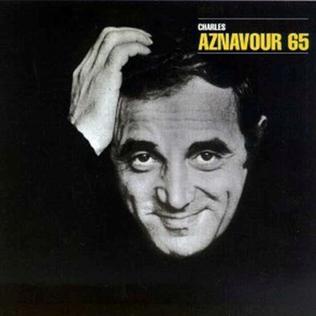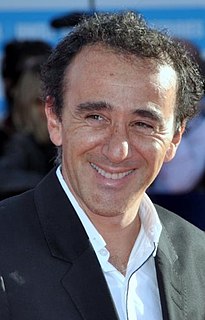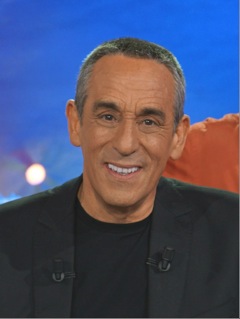Wilfred Le Bouthillier is an Acadian singer from the town of Tracadie-Sheila, New Brunswick and the winner of the 2003 edition of Star Académie, a Quebec reality show for aspiring singers.

Jamel Debbouze is a Moroccan-French actor, comedian, screenwriter, film producer and director. Best known for his stand-up comedy sketches, he also worked with director Alain Chabat in several films and other notable French humourists such as Florence Foresti, Fred Testot and Gad Elmaleh. He has starred in a number of box-office successes, including Amélie, Asterix & Obelix: Mission Cleopatra, Hollywoo and HOUBA! On the Trail of the Marsupilami. He is the founder of the Canal+ television show Jamel Comedy Club.
La Panhypocrisiade, ou la comédie infernale du seizième siècle is a poem in sixteen cantos by Louis Jean Népomucène Lemercier, composed essentially under the French Consulate but not published until 1819.

Hugues Jean Marie Auffray, better known as Hugues Aufray, is a French singer-songwriter and guitarist.

Alain Soral, identified in the civil registry as Alain Bonnet, and frequently also named using the full family name as Alain Bonnet de Soral, is a Franco-Swiss author, journalist, essayist, and film maker. He is the brother of the actress Agnès Soral. Soral lives in the Pyrenees-Atlantiques. Since June 2004, he has been a boxing coach. Soral was originally a communist and later worked for the far-right National Front before leaving in 2009. In 2007 he founded his own political association, Égalité & Réconciliation. At the same time he also launched a publishing company, KontreKulture, which he uses to publish contemporary controversial authors and to reissue certain out of print public domain books, that he believes are of historical importance.
"Parlez-moi d'amour" is a song written by Jean Lenoir in 1930. An English translation was written by Bruce Sievier and is known as "Speak to Me of Love" or "Tell Me About Love". Lucienne Boyer was the first singer to record the song and she made it very popular in France, America, and the rest of the world.

Trois mélodies is a set of mélodies for solo voice and piano, by Gabriel Fauré. It is composed of "Après un rêve", one of Faure's most popular vocal pieces, "Hymne", and "Barcarolle". The songs were written between 1870 and 1877, and published in 1878. They were not, however, originally conceived together as a set of three; the opus number 7 was imposed on them retrospectively in the 1890s, almost 20 years after their first publications.
François Valéry is a French singer-songwriter and composer.

Ce que je sais is a 1998 album recorded by French singer Johnny Hallyday. It was released on January 24, 1998, and achieved success in France and Belgium (Wallonia), where, however, it failed to top the charts, being blocked by the soundtrack album of The Titanic. It provided four singles in France, but a sole top ten hit : "Ce que je sais" (#9), "Debout" (#58), "Allumer le feu" (#39) and "Seul" (#32). The album was entirely composed by French artist Pascal Obispo, helped on certain songs by Zazie and Lionel Florence.

Julien Boisselier is a French actor.
Laurent Stocker is a French theatre and cinema actor, and a sociétaire of the Comédie-Française.

Hervé Vilard is a French pop–singer, who first became famous in the 1960s. His first single "Capri c'est fini" became an international hit in 1965 and rendered him instantaneously famous. The song sold 3.3 million copies.

Les Dix Commandements is a French-language musical comedy written by Élie Chouraqui and Pascal Obispo that premiered in Paris in October 2000.

"Capri c'est fini" is the first single of French singer Hervé Vilard. The French song written and sung by him was released on Mercury Records and became a huge French and international hit in the summer of 1965 along with Christophe's hit song Aline, launching Vilard's career and making him instantly famous. The song sold 3.3 million copies. Vilard released 7 language versions of the song. The inspiration came when Vilard saw a promotional travel poster of the Italian island Capri in a Paris Métro station. "C'est fini" comes from a popular song of Charles Aznavour of the same title. The song talks about a break-up of an earlier relationship that had started in Capri.
Laurent Louis is a French-speaking Belgian politician, former member of the Belgian Chamber of Representatives, and a Holocaust denier. He is known for anti-semitic speeches and actions, Holocaust denial, and for spreading rumors about other public figures.

Hollywood Girls : Une nouvelle vie en Californie, or simply Hollywood Girls, is a French soap opera shown on NRJ12.

Aznavour 65 is the sixteenth French studio album by the French-Armenian singer Charles Aznavour, released in 1965. According to Allmusic, the album captures "one of French pop's best singers at the height of his talent". In 1965 The New Yorker called it Aznavour's most exciting album.
Lucky Blondo is a French singer who was popular in the 1960s.
















